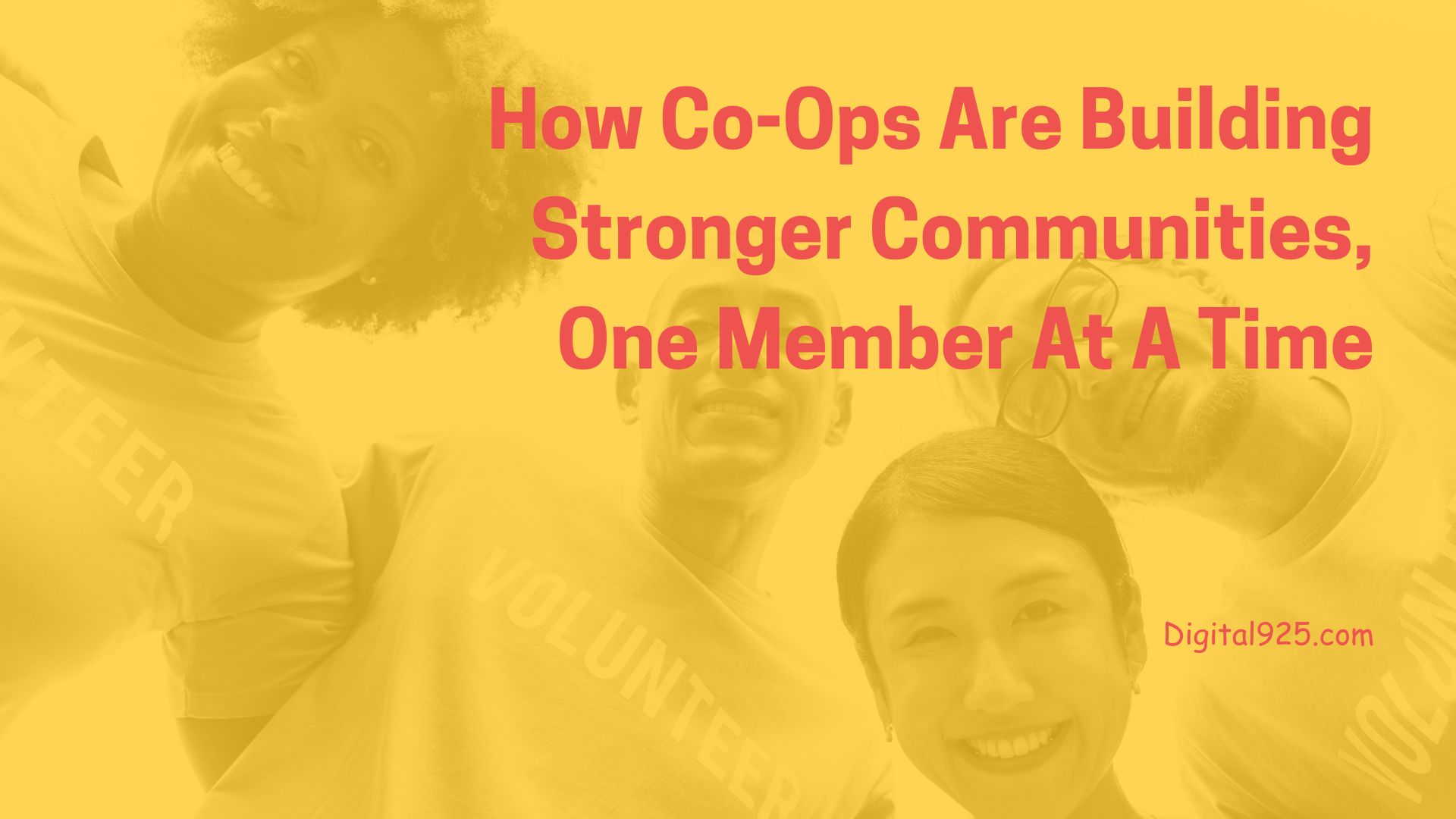How Co-Ops Are Building Stronger Communities, One Member At A Time
Co-operatives can feel like a breath of fresh air in a world dominated by corporations and conglomerates. They’re not just firms but community-driven entities where people unite, share resources, and work toward common goals, Building Stronger Communities. Often defined by their member-first approach, co-ops have been around for some time and continue evolving as economic and social empowerment pillars.
Peeking back into history, co-ops stemmed from a need to look out for the little guy during the Industrial Revolution. Fast forward to today, and they’ve mushroomed into multifaceted organizations spanning sectors as diverse as agriculture, retail, healthcare, and housing. Unlike traditional businesses focused squarely on profit, co-ops operate under core principles, emphasizing voluntary and open membership, democratic control, and members’ economic participation.
At the heart of every co-op is a simple yet powerful concept: one member, one vote. This democratic practice ensures that everyone has a stake in the decision-making process, regardless of their economic contribution. This equal footing approach breaks the chains of top-heavy decision-making in conventional businesses, fostering an inclusive atmosphere where every voice matters.
The contrast with traditional business models is stark. While regular companies often prioritize shareholder interests, co-ops put their members at the forefront, driving decisions that benefit the collective. This means focusing on profits, investing in the community’s welfare, and reinvesting to strengthen local economies. Through this lens, co-ops create a ripple effect that benefits society.
Co-operatives are innovative in tackling social issues and championing local farmers, artists, and entrepreneurs. They become platforms that nurture creativity and self-sustainability, ultimately making communities more resilient. And in today’s fast-paced world, that sense of community and belonging can be a real game changer.
Building Stronger Communities
In an era of economic disparities and social fragmentation, cooperatives emerge as beacons of hope, fostering community unity and resilience and Building Stronger Communities. By adhering to principles of shared ownership and democratic governance, cooperatives address immediate economic needs and lay the foundation for sustainable, inclusive growth.
Understanding Cooperatives: A Collective Approach to Economic Empowerment
A cooperative, or co-op, is an autonomous association of individuals united voluntarily to meet everyday economic, social, and cultural needs through a jointly owned and democratically controlled enterprise. This model empowers members by ensuring that profits and decision-making processes remain within the community, promoting equitable wealth distribution and local development.
Historical Context: The Evolution of the Cooperative Movement
The roots of the cooperative movement trace back to 1844 in England, where the Rochdale Society of Equitable Pioneers, a group of 28 artisans, established a cooperative store to provide affordable, quality goods to its members. This initiative laid the groundwork for the modern cooperative principles that continue to guide co-ops today.
People-Powered Success: The Impact of Co-Ops on Individual Empowerment
Joining a co-op can transform how individuals experience work and community, giving them chances they might not find elsewhere. By being part of a co-op, members often tap into unexpected benefits—better engagement, personal growth, and development opportunities.
Countless stories highlight this empowerment, such as taking the leap into leadership roles or venturing into fields they never dreamed of. From budding entrepreneurs to those returning to their roots, co-ops open doors to new possibilities, providing training and educational resources that members might not access otherwise.
One of the standout perks of co-ops stems from their commitment to equitable opportunities and Building Stronger Communities. It doesn’t matter who you are or where you’ve been; everyone gets a fair shot at success. This focus on equity creates a supportive environment where members feel valued and empowered to contribute their ideas and take initiative.
In these spaces, personal development takes center stage. Co-ops offer more than just jobs; they offer a culture of collaboration, where each person brings unique skills and learns from others. Whether improving communication skills, gaining new expertise, or building a professional network, members grow in directions they hadn’t anticipated.
Listening to the stories and testimonies of the people within these co-op communities is truly inspiring. For many, it’s more than professional growth—a profound personal journey. They gain confidence, build resilience, and experience a sense of belonging that’s often hard to find in other workplaces. This kind of empowerment raises their capacity to impact their personal lives and the community positively.
The Seven Cooperative Principles: A Blueprint for Community-Centric Business
Cooperatives worldwide operate based on a set of core principles that emphasize member participation, autonomy, and community focus:
- Voluntary and Open Membership: Co-ops are open to all individuals willing to accept the responsibilities of membership without gender, social, racial, political, or religious discrimination.
- Democratic Member Control: Members actively set policies and make decisions, adhering to a one-member, one-vote system.
- Member Economic Participation: Members contribute equitably to and democratically control the cooperative’s capital.
- Autonomy and Independence: Cooperatives are self-help organizations controlled by their members, ensuring autonomy even when entering agreements with external entities.
- Education, Training, and Information: Co-ops provide education and training for members, elected representatives, managers, and employees so that they can contribute effectively to developing their cooperatives.
- Cooperation Among Cooperatives: By working together through local, national, regional, and international structures, co-ops strengthen the cooperative movement.
- Concern for Community: Cooperatives work for the sustainable development of their communities through policies approved by their members.
Economic Benefits: Building Local Wealth and Resilience
Cooperatives play a pivotal role in bolstering local economies by Building Stronger Communities:
- Job Creation: Co-ops generate employment opportunities, often in regions where traditional businesses are reluctant to invest.
- Profit Redistribution: Surpluses are either reinvested into the cooperative or distributed among members, ensuring wealth remains within the community.
- Access to Affordable Goods and Services: Members can access products and services at competitive prices by pooling resources.
Social Impact: Fostering Unity and Empowerment
Beyond economic advantages, cooperatives significantly enhance social cohesion. Building Stronger Communities:
- Democratic Engagement: Members are encouraged to participate in decision-making processes, fostering a sense of ownership and responsibility.
- Community Development: Co-ops often engage in initiatives that address local challenges, from education to infrastructure improvements.
- Inclusive Growth: By prioritizing people over profit, cooperatives ensure that marginalized groups have a voice and stake in economic activities.
Modern Applications: Cooperatives in the Digital Age
The cooperative model has evolved to address contemporary challenges, giving rise to platform cooperatives. These digital platforms—such as ride-sharing apps or online marketplaces—are owned and governed by the users. This approach ensures that the benefits of the digital economy are equitably shared among those who contribute to and depend on these services.
Bridging the Community Gap: Co-Ops as Pillars of Sustainable Growth
The power of co-ops extends beyond their members, branching out to meaningfully influence entire communities. Economically, co-ops play a critical role in bolstering local economies. They keep money circulating within the community, focusing on local production and consumption, which supports local businesses and creates jobs.
Socially, co-ops strengthen community ties. By fostering a culture of mutual support and collective problem-solving, they help build trust among members. This trust breaks down barriers and fosters unity, enhancing social cohesion.
Co-ops aren’t just sticking to traditional methods; they’re at the forefront of innovation and sustainability. Many co-ops are pioneering green initiatives and pursuing sustainability goals that are increasingly important today. From reducing carbon footprints to adopting sustainable agricultural practices, they set examples for other businesses.
Yet, it’s not always smooth sailing. Co-ops face their own set of challenges, such as limited access to capital or navigating complex regulations. However, they tackle these issues head-on, often turning to collaboration and resource-sharing among co-ops. These strategies help them to remain resilient and adaptive over time.
Looking forward, co-ops could play an even more significant role in Building Stronger Communities, especially with the increasing global focus on local impact and sustainable practices. As models of solidarity and shared success, co-ops have the potential to offer blueprints for building stronger, more resilient communities everywhere.
Conclusion: Embracing Cooperative Models for Sustainable Futures
Cooperatives embody a resilient and inclusive economic model prioritizing community needs and democratic governance. By embracing cooperative principles, communities can address systemic inequalities, empower individuals, and build a foundation for sustainable development. As we navigate the complexities of the modern world, the cooperative movement offers a viable path toward a more equitable and connected society.







